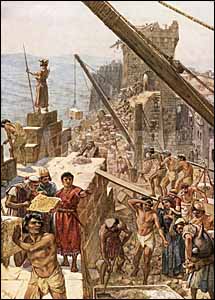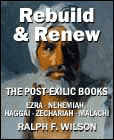
|
Old Testament
New Testament
Gospels
Acts
Paul's Letters
General Letters
Revelation
Topical Studies
Beginning the Journey (for new Christians). en Español

|
Old Testament
New Testament
Gospels
Acts
Paul's Letters
General Letters
Revelation
Topical Studies

|
Home
Bible Studies
Articles
Books
Podcasts
Search
Menu
Donate
About Us
Contact Us
FAQ
Sitemap
 William Brassey Hole, 'Rebuilding the Wall of Jerusalem under Nehemiah' oil on canvas, in The Holy Bible. Containing The Old And New Testaments (Eyre & Spottiswoode, 1925) |
Old Testament history has two primary "watersheds," by which events are date "before" and "after." The first of these is the Exodus from Egypt. The second is the Exile to Babylon as judgment for the apostasy of God's people. Amazingly, however, God brings a remnant of his people back from exile. It is this "post-exilic" period that we're concentrating on here.
The Post-Exilic Books of Ezra, Nehemiah, Haggai, Zechariah, and Malachi are written about the period between 537 and perhaps 430 BC. Themes include returning to Jerusalem after the Exile, rebuilding the temple, restoring the wall, and then learning to walk before the Lord with sincerity and purity.
Of course, these books seem pretty obscure to the average believer. As a boy I was impressed by a Sunday school illustration of people celebrating the restoration of the wall of Jerusalem under Nehemiah -- thousands of people marching on top of the new wall! You've probably heard some tithing sermons from Malachi -- "God will open the windows of heaven." But perhaps your familiarity ends there.
These five books have been revered as the inspired Word of God for more than two thousand years and contain vital nuggets of truth that God has for you and me. As I've been pouring over these books for the past twelve months, I'm beginning to see how important they are. Jesus himself quotes from Zechariah and Malachi.
The books include:
- How God changes the heart of kings to bless His people (Ezra, Nehemiah).
- How to handle the enemies -- both physical and spiritual -- who hinder the rebuilding of the Temple of God in Jerusalem and in our hearts (Ezra).
- Why God withholds his blessing, and why he restores it (Haggai).
- Messianic promises of Christ's glory in the temple (Haggai).
- How God uses prophets to encourage, motivate, and correct his people (Haggai, Zechariah, Malachi).
- Why we shouldn't despise the day of small beginnings (Zechariah).
- Messianic prophecies of Jesus entering Jerusalem on a donkey, "the one they have pierced," the 30 pieces of silver, the "cleansing fountain," and striking the shepherd that the sheep are scattered (Zechariah).
- Nehemiah's faith, managerial wisdom, and spiritual toughness to complete God's assignment (Nehemiah).
- The outstanding feat of restoring the broken wall in only 52 days -- amidst heavy opposition -- and the importance of building protective walls in our lives to guard God's work in us (Nehemiah).
- The amazing spiritual revival of Ezra's day, and why it waned (Ezra).
- What happens when believers marry unbelievers (Ezra, Nehemiah, Malachi).
- Finding the joy of the Lord as our strength (Nehemiah).
- Spiritual lessons on purity of heart in worship and giving to God (Malachi).
- Prophecies about John the Baptist -- the Messenger of Yahweh (Elijah who is to come) -- and Jesus, the Messenger of the Covenant, and the Son of Righteousness who rises with healing in his wings (Malachi).
- And much, much more....
I'm particularly interested in spiritual lessons that we disciples of Jesus can apply to our lives to help us grow. These books are chock full of lessons for disciples, which I'll summarize at the end of each lesson, as well as highlight in the discussion questions interspersed in each lesson.
Zechariah, especially, contains a number of symbolic images. I won't try to interpret them all, but will concentrate on what the prophet says to the people that relates to their current task of rebuilding, so don't expect an End Times timeline here.
Unlike some of my studies of New Testament books, where we cover only a few verses per lesson, in this study of the post-exilic books we'll often cover several chapters per lesson. I feel a little apologetic that some of the chapters are so long. I've cut them down as far as I can and moved some into footnotes, but I want to leave enough so that someone doing a careful study has helpful material to guide them. If you must, skip some material to get to the material directly referred to in the Discussion Questions, for those contain the most important applications.
 Available in paperback, PDF, Kindle formats |
I invite you to join me as we take a JesusWalk through these important books. The Spirit has much to teach us here, as we're open to His voice. May God bless us as we study together.
Dr.
Ralph F. Wilson
Loomis, California
September 1, 2017
Copyright © 2026, Ralph F. Wilson. <pastor![]() joyfulheart.com> All rights reserved. A single copy of this article is free. Do not put this on a website. See legal, copyright, and reprint information.
joyfulheart.com> All rights reserved. A single copy of this article is free. Do not put this on a website. See legal, copyright, and reprint information.


 To be notified about future articles, stories, and Bible studies, why don't you subscribe to our free newsletter, The Joyful Heart, by placing your e-mail address in the box below. We respect your
To be notified about future articles, stories, and Bible studies, why don't you subscribe to our free newsletter, The Joyful Heart, by placing your e-mail address in the box below. We respect your